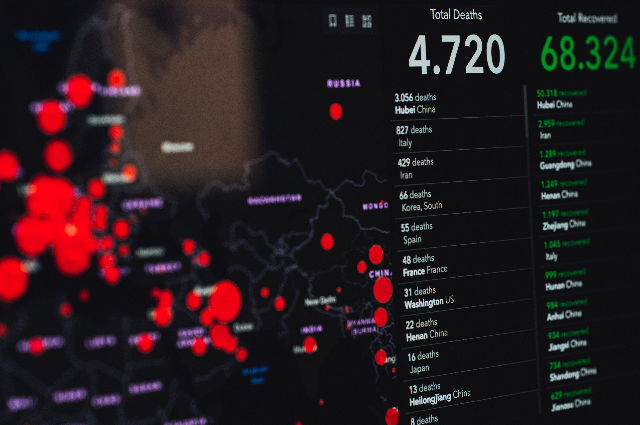
Background:
The B.1.617.2 (delta) variant of the severe acute respiratory syndrome coronavirus 2 (SARS-CoV-2), the virus that causes coronavirus disease 2019 (Covid-19), has contributed to a surge in cases in India and has now been detected across the globe, including a notable increase in cases in the United Kingdom.
Introduction:
India has experienced a surge in cases of coronavirus disease 2019 (Covid-19) since late March 2021, reaching more than 400,000 cases and 4000 deaths reported each day in early May 2021. This increase has resulted in hospital services becoming overwhelmed and in a scarcity of oxygen supplies. Although only a small proportion of samples have been sequenced, B.1.617 lineages of the severe acute respiratory syndrome coronavirus 2 (SARS-CoV-2) have dominated. The B.1.617.2 (delta) variant was first detected in India in December 2020 and became the most commonly reported variant in the country starting in mid-April 2021. As of May 19, 2021, the variant had been detected in 43 countries across six continents in GISAID (originally an acronym for global initiative on sharing avian influenza data but more recently a site for compiling sequence data on viruses, particularly influenza and corona viruses, that threaten to cause a pandemic.
Reviews:
Joint Committee on Vaccination and Immunisation, was made to use an extended administration interval of up to 12 weeks in order to maximize the number of vulnerable persons receiving the first dose during the second wave of the pandemic in the context of constraints on vaccine supply and delivery. Vaccines have been found to be highly efficacious at preventing symptomatic disease, as shown by clinical trials real-world evidence. The B.1.1.7 (alpha) variant, first identified in the United Kingdom, was the predominant lineage seen between January and May 2021. Levels of protection against the alpha variant that are conferred by vaccination are similar to those observed in clinical trials, with additional protection against severe disease.
Laboratory data indicate that the B.1.351 (beta) variant has reduced neutralization, according to analysis of serum samples obtained from vaccinated persons. Observational data from Qatar indicated modestly reduced effectiveness against symptomatic disease caused by this variant but high levels of effectiveness against severe, critical, or fatal disease in persons vaccinated with the BNT162b2 vaccine (Pfizer–BioNTech). Furthermore, a trial of the NVX-CoV2373 vaccine (Nova Vax) showed 51.0% efficacy against the beta variant.Finally, high levels of neutralization have been seen with the P.1 (gamma) variant in serum samples obtained from persons vaccinated with the BNT162b2 vaccine, and one study showed only minimally reduced vaccine effectiveness against test-positive cases with one dose of messenger RNA vaccine. The delta variant is characterized by the spike protein mutations T19R, Δ157-158, L452R, T478K, D614G, P681R, and D950N.

Several of these mutations may affect immune responses directed toward the key antigenic regions of receptor binding protein (452 and 478) and deletion of part of the N-terminal domain. P681R is at the S1–S2 cleavage site, and it appears that strains with mutations at that site may have increased replication, which leads to higher viral loads and increased transmission. Data on the effectiveness of COVID-19 vaccines against clinical outcomes with this variant have been limited. In this study, we aimed to estimate the effectiveness of two COVID-19 vaccines, BNT162b2 and ChAdOx1 nCoV-19 (AstraZeneca), against symptomatic disease caused by the delta variant.
Identification of Variant:
Whole-genome sequencing was used to identify the delta and alpha variants. The proportion of all positive samples that were sequenced increased from approximately 10% in February 2021 to approximately 60% in May 2021. Sequencing is undertaken at a network of laboratories, including the Wellcome Sanger Institute, where a high proportion of samples has been tested, and whole-genome sequences are assigned to Public Health England definitions of variants on the basis of mutations.
Conclusion:
Overall, we found high levels of vaccine effectiveness against symptomatic disease with the delta variant after the receipt of two doses. These estimates were only modestly lower than the estimate of vaccine effectiveness against the alpha variant. Our finding of reduced effectiveness after the first dose would support efforts to maximize vaccine uptake with two doses among vulnerable groups in the context of circulation of the delta variant.
. . .
References:
- Rubin EJ, Baden LR, Udwadia ZF, Morrissey S. India’s Covid-19 crisis. N Engl J Med 2021;384(18):e84.
- Elbe S, Buckland-Merrett G. Data, disease and diplomacy: GISAID’s innovative contribution to global health. Glob Chall 2017;1:33-46.
- Public Health England. SARS-CoV-2 variants of concern and variants under investigation in England. Technical briefing May 13 2021.
- Joint Committee on Vaccination and Immunisation. Priority groups for coronavirus (COVID-19) vaccination: advice from the JCVI, 30 December 2020. London: Department of Health and Social Care, January 6, 2021.
- Joint Committee on Vaccination and Immunisation. Optimising the COVID-19 vaccination programme for maximum short-term impact. Independent report. London: Department of Health and Social Care, January 26, 2021.
- Polack FP, Thomas SJ, Kitchin N, et al. Safety and efficacy of the BNT162b2 mRNA Covid-19 vaccine. N Engl J Med 2020;383:2603-15.
- Voysey M, Clemens SAC, Madhi SA, et al. Safety and efficacy of the ChAdOx1 nCoV-19 vaccine (AZD1222) against SARSCoV-2: an interim analysis of four randomised controlled trials in Brazil, South Africa, and the UK. Lancet 2021;397:99-111.
- Baden LR, El Sahly HM, Essink B, et al. Efficacy and safety of the mRNA-1273 SARS-CoV-2 vaccine. N Engl J Med 2021;384:403-16.
